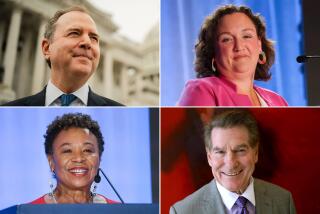Lists Key Accomplishments at Major Reelection Fund-Raiser : Cranston Adopts High Profile
- Share via
Told recently by an aide that even his supporters are not aware of some of his accomplishments, California Sen. Alan Cranston on Tuesday night recounted more than 50 major things that he says he has done since he was first elected to the Senate in 1968.
The list included “lifting the banner of civil rights,” making sure Vietnam veterans get better counseling and reducing the capital gains tax rate from 50% to 20%.
However, what jumped out in Cranston’s speech at the first major fund-raiser for his 1986 reelection campaign were his statements that he had helped keep the United States from going to war in Angola and may have helped save the life of President Reagan.
“I was the architect of that emergency medical measure (the Emergency Medical Systems Act) which reduced deaths from automobile accidents by 42%, where it was adopted,” Cranston told more than 500 people at the Beverly Hilton. “I saw to it that it was signed into law by one Republican President, Richard Nixon, and quite possibly (it) saved the life of another Republican President, Ronald Reagan.”
Cranston was referring to his introduction in 1973 of legislation that helped establish trauma centers, one of which was installed at George Washington University Hospital in the District of Columbia. Emergency medical services at the trauma center were credited with helping save the life of Reagan, when he was shot by John Hinckley on March 30, 1981.
Then there was the war in Angola, Cranston said, “where one act of mine helped keep us out of war. . . .”
Cranston was referring to an amendment passed by Senate Democrats in 1975 that prevented President Gerald R. Ford from sending covert aid to one of the guerrilla factions fighting for control of Angola. The legislation was actually introduced by John V. Tunney, California’s junior senator from 1970 to 1976.
However, Cranston press secretary Murray Flander said Wednesday that the Angola legislation was Cranston’s idea and that “Alan turned it over to John to help his reelection effort” in 1976.
Tunney, now a Los Angeles real estate developer, was at the Cranston dinner. He said in an interview Wednesday, “You know when Alan mentioned how he had kept us out of Angola last night, it kind of jumped out at me too, but then I thought about it, and I realized he was right.”
Tunney said Cranston had called him at his Washington apartment in December, 1975, and asked him to help prevent the covert aid. That led to the Tunney amendment.
However, as for helping his reelection, Tunney said, “Nothing hurt me more than that amendment. There is a significant body of opinion in California that we must always stand up to the Russians. Still, I’m glad I did it.”
Tunney was defeated for reelection in 1976 by Republican S. I. Hayakawa.
Flander said the Angola matter “is a good example of how Alan does the work and turns it over to someone else to get the credit.”
Still, as his Tuesday speech indicated, Cranston is now concerned that his Senate profile has been a little too low. His campaign manager, Darry Sragow, has urged the senator to do a better job of reminding the electorate of his accomplishments.
Senate Democrats believe that Cranston faces a tough reelection in 1986, according to Sen. George Mitchell of Maine, the new chairman of the Democratic Senatorial Campaign Committee, the main supplier of party funds to Democratic senators up for reelection.
Tough Races
Mitchell, who was the guest speaker at the Cranston fund-raiser, said in an interview that Cranston’s reelection and that of Sen. Patrick Leahy of Vermont are expected to be the Democrats’ toughest races in 1986.
“The Republicans have made impressive gains in California and all the Sun Belt states,” Mitchell said. “But I still think Alan (Cranston) will be hard to defeat.”
The crowd at the fund-raiser included Hollywood celebrities, banking and insurance executives, lawyers and developers, many of whom have supported Cranston for years.
They were put in good spirits by the first part of Mitchell’s speech, which was laced with amusing remarks about politicians. However, the mood shifted noticeably when Mitchell finished up by reminding the audience that Cranston has long worked to reduce the threat of nuclear war.
Cranston then strode to the podium and said: “I’m sure you all know we are on the brink of destruction. . . . Elect me and I’ll finish the job.”
For a few moments there was a stunned silence, and then the crowd realized it was a joke and mild laughter began to sweep the room.
More to Read
Get the L.A. Times Politics newsletter
Deeply reported insights into legislation, politics and policy from Sacramento, Washington and beyond. In your inbox twice per week.
You may occasionally receive promotional content from the Los Angeles Times.










